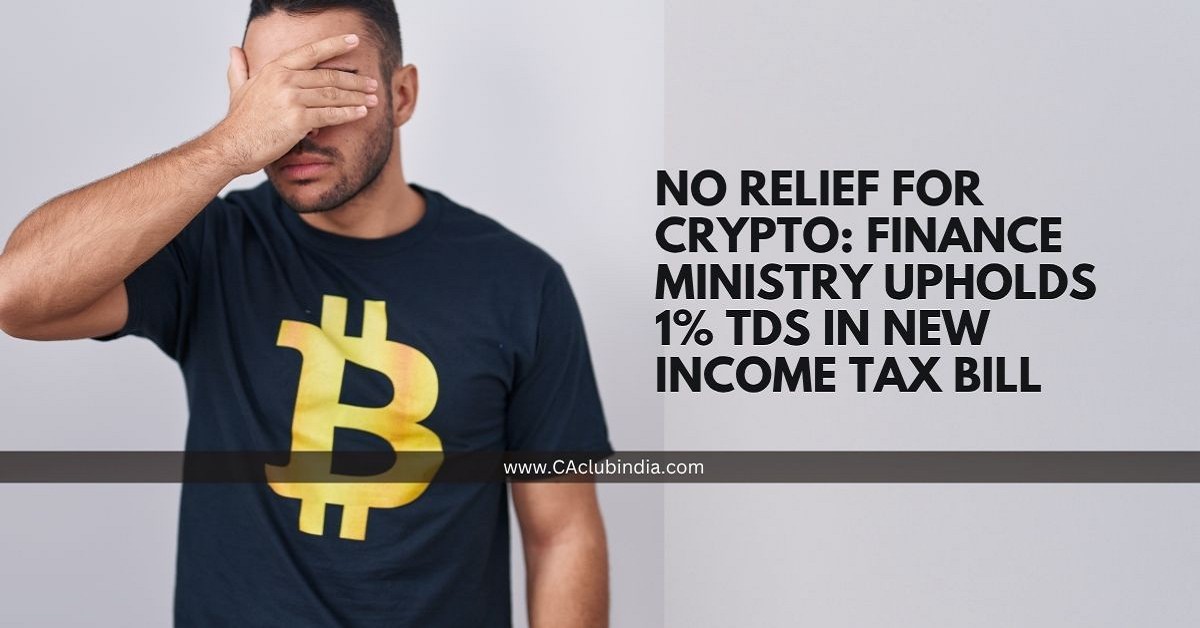The Ministry of Finance has officially rejected a key proposal to ease the tax burden on crypto transactions, retaining the contentious 1% Tax Deducted at Source (TDS) under Section 194S of the Income Tax Act. The proposal to reduce the TDS to 0.01% and raise the transaction threshold to Rs 5 lakh was denied in the Select Committee Report on the Income Tax Bill, 2025, tabled in Parliament this week.
Currently, a 1% TDS applies to all VDA transactions exceeding Rs 10,000 (or Rs 50,000 for specified persons) annually. The provision, introduced in 2022, was aimed at tracking gains from crypto and NFT trading. However, stakeholders have long criticized it for reducing liquidity and driving Indian users toward offshore platforms.

Government Response: "Rates Already Rationalised"
The Ministry, in its written submission to the Committee, said:
"Thresholds and rates have been sufficiently rationalised. There cannot be a same rate or threshold for all types of payments as the component of income embedded in any payment is different."
According to the Ministry, rates under the revised Income Tax Bill are limited to four bands-0.1%, 1%, 2% and 10% depending on transaction types and payee categories. It argued that existing rates balance administrative feasibility with revenue needs.
Industry Pushback: "Missed Opportunity for Compliance Growth"
The crypto industry, backed by research from the Esya Centre, had urged for TDS reduction to 0.01%, in line with the Securities Transaction Tax (STT) for stocks and commodities. The research warned that the current framework is pushing Indian crypto users offshore, leading to large-scale TDS leakage.
"India could lose up to Rs 17,700 crore in TDS over five years if the 1% rate persists," the Esya Centre projected. "Reducing TDS to 0.01% could bring 82% of users back to domestic platforms and generate Rs 91,690-Rs 1,83,380 crore in tax revenue."
The report also pointed out that most VDA sellers fall in lower income brackets, and raising the threshold would reduce the compliance burden and refund processing strain on the tax department.
Other Demands Also Denied
The Finance Ministry also declined several other TDS-related proposals:
- Uniform TDS rates: Dismissed due to the varied nature of payments and embedded income.
- Exemption for offshore suppliers: Rejected, with the Ministry suggesting case-by-case treatment via circulars or FAQs.
- TDS table structure: The move from section-based to table-format compliance will continue, despite concerns about ERP changes and litigation risk.
Experts Warn of Transition Challenges
Tax professionals flagged potential disruptions due to the structural change in TDS compliance formats.
"ERPs, TRACES and e-filing systems will all require significant upgrades," said one tax expert."The new tabular format may cause confusion initially and could lead to fresh litigation if transitional guidance isn't issued."
They also raised concerns about how previous court rulings and circulars under existing sections would apply in the new format.
Crypto Regulation Still in Limbo
India continues to maintain a "tax-first, regulate-later" stance toward the crypto sector. While a regulatory framework is still under discussion, tax measures such as the 30% capital gains tax and 1% TDS remain firmly in place.
With the government holding firm on current tax rates, industry leaders caution that this may discourage domestic participation, hamper innovation, and slow formalisation in the fast-evolving Web3 and digital asset space.









 CAclubindia
CAclubindia
